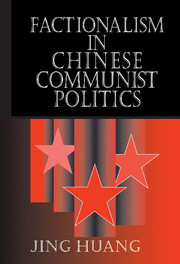Book contents
- Frontmatter
- Contents
- List of Figures and Tables
- Preface
- List of Abbreviations
- Introduction
- 1 Factionalism, the Puzzle of Chinese Communist Politics
- 2 Factionalism and the Political System in China
- 3 The Establishment of the Yan'an Round Table
- 4 The Transition of the Yan'an Round Table
- 5 Crises in Leadership Relations with the Two-Front Arrangement
- 6 The Collapse of the Yan'an Round Table and the Unleashing of Factionalism
- 7 Deng Xiaoping's Dominance: Factionalism Prevails over the Party Spirit
- 8 Conclusion
- Selected Bibliography
- Index
2 - Factionalism and the Political System in China
Published online by Cambridge University Press: 11 September 2009
- Frontmatter
- Contents
- List of Figures and Tables
- Preface
- List of Abbreviations
- Introduction
- 1 Factionalism, the Puzzle of Chinese Communist Politics
- 2 Factionalism and the Political System in China
- 3 The Establishment of the Yan'an Round Table
- 4 The Transition of the Yan'an Round Table
- 5 Crises in Leadership Relations with the Two-Front Arrangement
- 6 The Collapse of the Yan'an Round Table and the Unleashing of Factionalism
- 7 Deng Xiaoping's Dominance: Factionalism Prevails over the Party Spirit
- 8 Conclusion
- Selected Bibliography
- Index
Summary
The fundamental departure of this study from the literature on factionalism in CCP politics is that factionalism is an independent variable in the shaping of leadership relations and leadership decision making. This chapter shows why and how factionalism is embedded in the CCP political system, a system that has provided the necessary and sufficient conditions for the development of factionalism in political affairs. The analysis then focuses on how factionalism has reinforced itself through cadre promotion and changes in leadership relations.
CONDITIONS FOR THE DEVELOPMENT OF FACTIONALISM
Proposition 1: Power is entrusted to individuals instead of institutions in a hierarchic context. This pattern of personal entrustment of power provides a sufficient condition for the development of factionalism, for it fosters guanxi between a leader and his appointees on which factional linkages can be developed as common political interests emerge in repeated exploitations of their guanxi in political affairs.
Personal Entrustment of Power
The pattern of power distribution in CCP politics is rooted in the process of its revolution. The perilous situation after the bloody setback in 1927 forced the CCP to embark on an arduous route for power, a route best summed up by Mao as “setting up the armed independent regimes in the countryside and encircling the cities from the rural areas”. With this strategy, the CCP cadres were sent to the remote and usually mountainous regions where the authority of the incumbent government could barely reach.
- Type
- Chapter
- Information
- Factionalism in Chinese Communist Politics , pp. 55 - 106Publisher: Cambridge University PressPrint publication year: 2000

